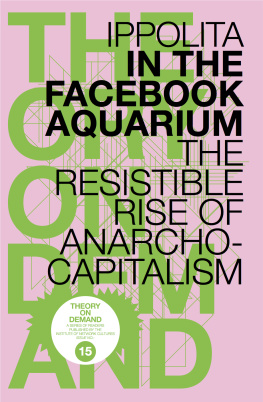In the Facebook Aquarium
In the Facebook Aquarium: The Resistable Rise of Anarcho-Capitalism
In their new work the research collective Ippolita provides a critical investigation of the inner workings of Facebook as a model for all commercial social networks. Facebook is an extraordinary platform that can generate large profit from the daily activities of its users. Facebook may appear to be a form of free entertainment and self-promotion but in reality its users are working for the development of a new type of market where they trade relationships. As users of social media we have willingly submitted to a vast social, economic and cultural experiment.
By critically examining the theories of Californian right-libertarians, Ippolita show the thread con- necting Facebook to the European Pirate Parties, WikiLeaks and beyond. An important task today is to reverse the logic of radical transparency and apply it to the technologies we use on a daily basis. The algorithms used for online advertising by the new masters of the digital world Facebook, Apple, Google and Amazon are the same as those used by despotic governments for personalized repression. Ippolita argues we should not give in to the logic of conspiracy or paranoia instead we must seek to develop new ways of autonomous living in our networked society.
Ippolita are an interdisciplinary research group active since 2005. They conduct wide-ranging research on technology and its social effects. Their published works include Open non e Free (2005), The Dark Side of Google (2013) and La Rete e libera e democratica. FALSO! (2014). The collective also run workshops on digital self-defense for girls, children, academics, affinity groups, computer geeks and curious people. See: http://ippolita.net
First published in Italian, 2012.
English edition revised and updated, June 2015.
Colophon
Theory on Demand #15
The Facebook Aquarium
Author: Ippolita
Translated by: Patrice Riemens and Cecile Landman
Copy-editing: Matt Beros
Editorial support: Miriam Rasch
Design: Katja van Stiphout
EPUB development: Matt Beros
Printer: Print on Demand
Publisher: Institute of Network Cultures, Amsterdam, 2015
ISBN: 978-94-92302-00-7
Revised and updated English edition, June 2015
First published in Italian as Nell'acquario di Facebook, Ledizioni, 2012.
Published in French as J'aime pas Facebook, trans. Isabelle Felici, Payot, 2012.
English version originally published as a feuilleton on Nettime, 2014.
Supported by the Antenna Foundation, Nijmegen (http://www.antenna.nl) and Casa Nostra, Vogogna-Ossola, Italy.
Contact
Institute of Network Cultures
Phone: +3120 5951865
Email: info@networkcultures.org
Web: http://www.networkcultures.org
This publication is available through various print on demand services.
For more information, and a freely downloadable PDF:
http://networkcultures.org/publications
This publication is licensed under the Creative Commons Attribution-NonCommercial-NoDerivatives 4.0 International (CC BY-NC-SA 4.0).

'I started building an aquarium. It became larger and larger, until I managed to build a saltwater aquarium. Then I stopped and thought, either I walk out, or I go into the aquarium myself.'
- Malcolm
'Hit a straight lick with a crooked stick.'
- Jamaican proverb
Contents
In the Facebook Aquarium - Pre-Afterword
This essay is a critical investigation of the phenomenon of social media and the so-called Web 2.0. We use the example of Facebook, but most of our analysis is applicable to all the free services on the internet. We want to stress that our approach is anti-prohibitionist. This is not a simple stand 'against' all commercial internet experiences, but a description from a hybrid political and situated approach.
The problem is not the existence of machines in general, and not even digital cameras or social-networks in particular, but specifically these machines that are made to control us, with algorithms designed to record our online activites while generating profit. We have to practice harm reduction and prevention, but we also must use creative skills to introduce heterogeneity, and move like nomads between the folds and crevices. Every tactic is welcome, there are no overall answers or global solutions, but only individual, local paths that can become collective, translated, betrayed and adapted to different realities.
For example, the relationship with the social can be framed in many ways that are useful: with the application of the rules of social media marketing to political communication, with hacking, through desertion, and the construction of the social 'other'. We like the idea of replacing the concept of the social network with the trusted network. We do not need to socialize more, but we need to build organized networks with the people and the machines that we trust.
The difficulty lies in the organization, because as its name implies, it is a kind of 'organic' matter, typical of organisms, and this process of de-corporealization, the delegation of vital-to-the-machines issues, already started long ago. Formation is required for all, since the digital natives are often analog illiterates and almost always digitally nave users of the internet who don't absorb consumerism antibodies at birth. For a start, they need to be trained to not leave traces on the web, to learn social engineering techniques in order to recognize these when they are applied to them, and to understand their own digital alter egos. They need not be scared of the dangers, nor excited of the compelling professional opportunities offered by the sharing economy; or of even learning how to use commercial devices, or worse still, filling in forms which are destined to enter into the oblivion guaranteed by the Google bureaucracy.
We are available; above all this is an invitation to write to us. It's a perfect time for radical critique. The group Ippolita has long since scattered throughout the world. We come from different disciplines, but we all grew up in the shadow of hacklab and experiences of self-management. We use the cartographic method to describe the morphology of the objects that we examine, depending on each one's point of view.
The legacy of the 20th century has accustomed us to think that social control pertains only to the political, but it has long since become primarily an economic question of commercial implications. It is no coincidence that the NSA has made use of the collaboration with Microsoft, Yahoo, Google, Facebook, Apple and so on, to obtain data for the surveillance program PRISM. Although several companies have claimed to be unaware of the program and have refused to make such information automatically available on a large scale, it is easy to understand how their data storage capacity makes them the only credible partners to expand the scope of espionage. If only for the fact that these companies have been developing specific skills in this field for many years.
The mainstream media have cried foul; indignation about the interference of intelligence agencies, and the US government in particular has spread. It was a historical break, there will be a 'before' and 'after' Datagate. But few really care about where this vast quantity of personal data is stored, this data that every day is filtered through commercial platforms. It is certainly legitimate and necessary to protest the state bureaucracy and detest it, but those who feed the phobia of state, weighing in on the Snowden case and similar ones, may not be aware of the power that lies behind the States, their accomplices, and without them the pervasiveness of PRISM would not have the same effect. We are talking of the digital masters: Google, Amazon, Facebook, Apple and Microsoft are able to conserve our lives as we live them, moment by moment, orchestrating grandiose experiments with social technology where the rules are decided in the laboratory. For example, the alteration of the Facebook newsfeed in the 2014 experiment of emotional contagion which has involved approximately 689,000 unaware users. The Megamachine cannot exist without them.














